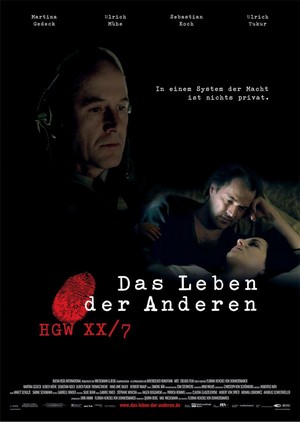
Das Leben der Anderen (2006)
The Lives of Others

Raiting: ![]() 8,4 /10
8,4 /10
Genre: Drama
Director: Florian Henckel von Donnersmarck
Stars: Ulrich Mühe, Sebastian Koch and Martina Gedeck
Country: Germany
Release date: 15 March 2006
Length: 137 minutes


Raiting: ![]() 8,4 /10
8,4 /10
Genre: Drama
Director: Florian Henckel von Donnersmarck
Stars: Ulrich Mühe, Sebastian Koch and Martina Gedeck
Country: Germany
Release date: 15 March 2006
Length: 137 minutes